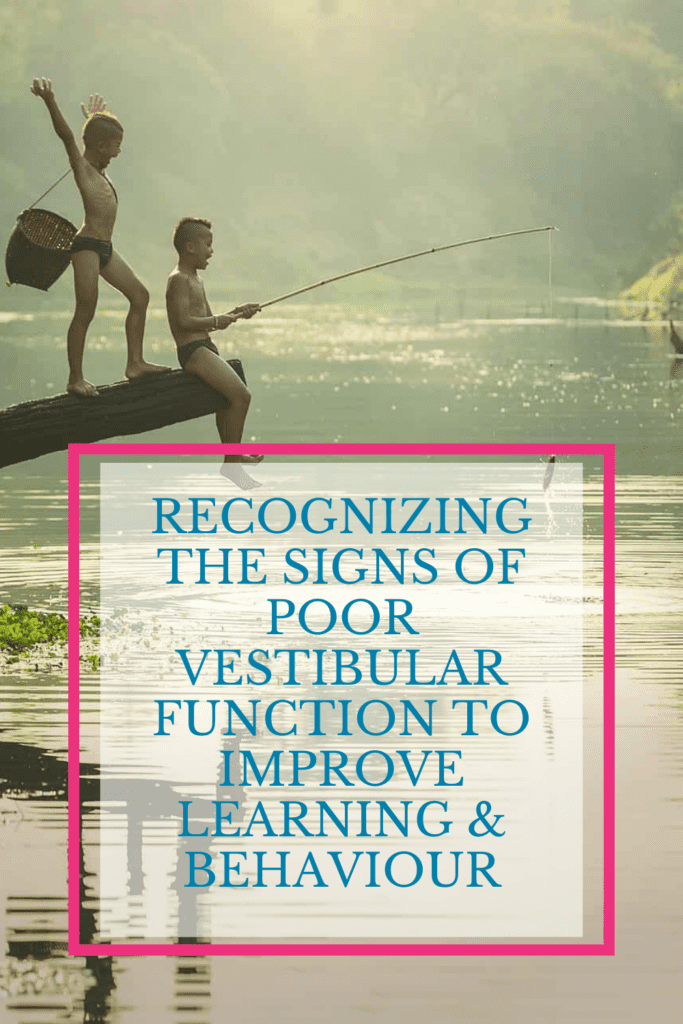From the time that Alana’s son, Reid was in school the teachers would comment that Reid always ‘had his head in the clouds’. By grade 4, Reid had a diagnosis of dyslexia as well as ADD. Alana had tried medication to get Reid more focused, but the side effects left Reid with no appetite and constant nose bleeds.
It didn’t take long to figure out that Reid had poor vestibular function. The reason Reid ‘daydreamed’ in class was because sitting for long periods of time resulted in his vestibular system being understimulated and his brain becoming even more sluggish.
Why Some Kids are Daydreamers
The way the vestibular system works is that movement and stimulation of the sensory system is connected to the area of the brain that helps us to stay alert. Sitting without any movement will make any of us sluggish, and when the vestibular system is already weak, the brain just kind of ‘checks out’.
Because traditional classrooms often involve so much sitting, kids with poor vestibular systems are at a greater risk of being label daydreamers or even being diagnosed with ADD.
Why Your Child Might Not be a Morning Person
Poor vestibular function is the same reason why so many kids have difficulty waking up and getting going in the morning. The vestibular system needs stimulation and movement after being asleep and unstimulated all night.
This lack of sensory stimulation is also why some kids have such rough mornings and can be more vulnerable to feeling more irritable, having worse sensory processing issues and behaviour.
Movement in the morning can help to recalibrate these kids after a night of sleep and in turn it can assist with a better morning. Movement helps to wake up the vestibular system.
Possible Causes Poor Vestibular Function:
- Injury
- Insufficient motor development or tummy time as an infant
- Inflammation
- Premature birth
- Exposure to excessive movement or sound in utero
- Insufficient tummy time or movement as an infant
- History of ear infections
- Developmental delay
- Immature nervous system development
The Signs of Poor Vestibular Function
The signs of poor vestibular function are listed below. What’s important to note is that some children have an underactive vestibular system and others have an overactive vestibular system and in either case, learning and behaviour can be impacted. No pun is intended when I say that for optimal learning and behaviour, the vestibular system is all about balance.
Underactive: Child seeks movement, spinning, rocking and may even be the ‘dare devil’.
Overactive: Child may avoid movement, sports, may complain of feeling nauseous and be more prone to anxiety.
General Signs of Vestibular Dysfunction:
- Fidgety
- Poor focus and attention
- Poor balance and coordination
- Excessive movement
- Motion sickness
- Constantly wants to spin or rock
- Reading difficulties
- Poor handwriting
- Needs to move to focus
- Poor auditory processing
- Complains of being dizzy
- Clumsy
- Vision issues like double vision
- Complains that words move or jump
- Dislikes crowds
- Likes weighted blankets
- Poor hand-eye coordination or sports abilities
- Difficulty copying notes from board
The more of these challenges that your child has, the more likely it is that they may have poor vestibular function. Improving this system through core development and balance exercises can produce better focus, learning and behaviour.
Re-training the vestibular system and other sense organs can help these kids to more confidently go through life and enjoy the activities that are not only fun for other kids but can further promote brain development.
If you want to learn more about my coaching programs that help children move past limitations and rise above learning and behaviour difficulties–contact me for a free Clarity Call.
In Health & Wholeness,
Lorraine


